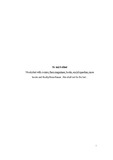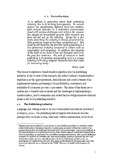JavaScript is disabled for your browser. Some features of this site may not work without it.
| dc.contributor.advisor | Sackett, P. J. | |
| dc.contributor.author | Daut Mohmud, Dahlina | |
| dc.date.accessioned | 2008-03-04T12:51:31Z | |
| dc.date.available | 2008-03-04T12:51:31Z | |
| dc.date.issued | 2006-12 | |
| dc.identifier.uri | http://hdl.handle.net/1826/2383 | |
| dc.description | This thesis is submitted in partial fulfilment of the requirements for the degree of Master of Science. The thesis sets out the results of a structured programme of research or design, development or management studies demonstrating the candidate's own ability to conduct original investigations, to test ideas (either from the candidate's own or those of others) and to obtain appropriate conclusions from the work. Unlike the situation applicable for theses produced in connection with doctoral degrees, candidates are not required to exercise independent critical judgement in the relevant field of study or to make an original contribution to knowledge. A Master's thesis is not intended to be an absolutely definitive work on the subject to which it relates. Theses encapsulate and present the results of a programme of study and research, undertaken in a defined period of time, and do so in a way that has satisfied the assessment requirements for the degree to which they relate. | en_UK |
| dc.description.abstract | This thesis presents the findings and conclusions of research that was undertaken with the purpose of understanding the issues and challenges of e-transformation in the publishing industry, particularly the editorial phase, and in a government controlled environment of Malaysia. The research followed an exploratory inquiry and a case study approach, was conducted in a publishing house in Kuala Lumpur. This study was based upon data collected through in depth interview with 18 editors, documentary research (manuals, house styles, General Orders of the Government of Malaysia, forms, correspondence, other in house documents, speeches and local news), physical artefacts (132 edited manuscripts involving 33 editors), archival records (project files spanning 2 years of published works) and literature research. 10 major issues were identified and grouped into 4 categories, 4 major issues from previous failed systems identified, 9 major impacts categorised into 3 different categories were identified and 7 recommendations from the editors were identified for future systems. Focusing on these issues and impacts, several measures were recommended that would improve e-transformation in the company. Guidelines were developed to streamline the transformation and a new workflow proposed towards efficiency in a new medium. Disruption is also identified in the process of transformation. The research concludes by describing the phenomena of transformation in the editorial phase, that there are issues, impacts, disruption and unsettling points before, during and after transformation that would need to be thoroughly investigated, understood and addressed, to successfully transform the editorial phase. The research contributes to both theory and practice. It also proposed a conceptual model to understand the transformation particularly in a public sector; it developed a guideline for effective transformation and developed a workflow for the editorial phase. | en_UK |
| dc.language.iso | en | en_UK |
| dc.publisher | Cranfield University | en_UK |
| dc.rights | © Cranfield University 2006. All rights reserved. No part of this publication may be reproduced without the written permission of the copyright owner. | en_UK |
| dc.title | E-Transformation in the publishing industry | en_UK |
| dc.type | Thesis or dissertation | en_UK |
| dc.type.qualificationlevel | Doctoral | en_UK |
| dc.type.qualificationname | PhD | en_UK |

